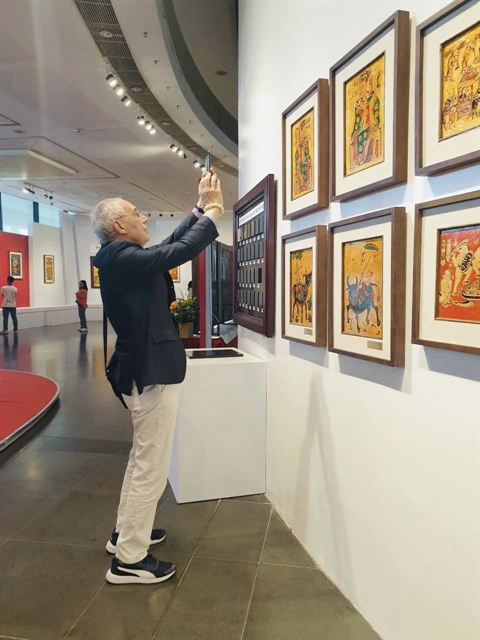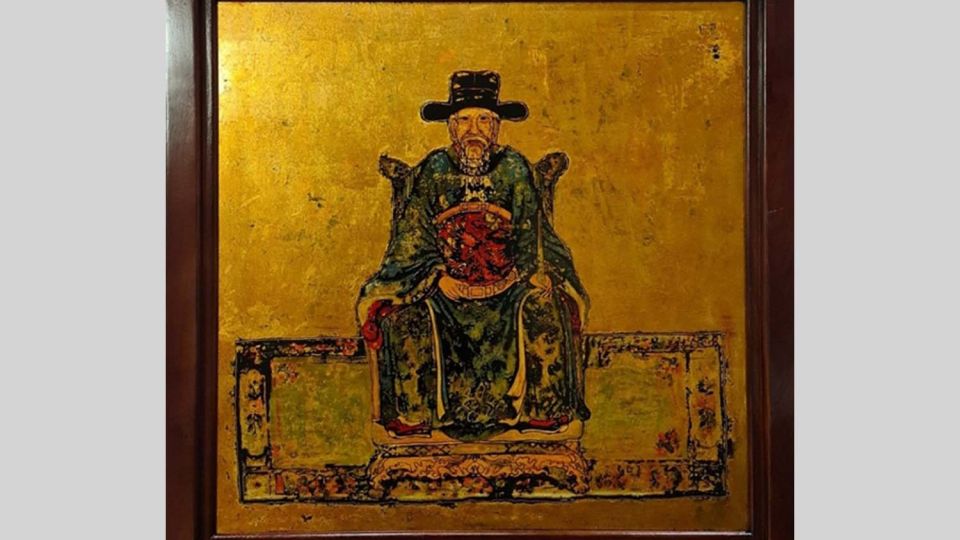October 31, 2022
HANOI – An exhibition at Hà Nội Museum is showing a combination of engraved lacquer paintings of folk themes to help preserve and develop the folk painting genre in the modern era.
The exhibition Con Đường (The Way) displays nearly 100 paintings with renewed folk themes, which have been done by combining engraving and lacquer painting techniques.
At the exhibition, visitors can see a painting of the national hero Nguyễn Trãi (1380-1442), which is a stunning highlight of the show. The painting is 106cm by 106cm and is based on the original in the museum’s collection. The original is gouache on cloth and was made in 1917 with the signature P.D.Tue.
“The painting is rare, and information on it is very limited,” according to the museum representative. “We are on the way to finding out who P.D.Tue is,” she said.

ART SHOOT: A French collector takes photo at the exhibition.
The new painting of the national hero is lacquer engraving, a result of a collaboration between the museum and the Latoa Indochine artists group aiming at preserving and publicising folk paintings.
The images of familiar folk paintings such as Thần Kê (Chicken God) and Ngũ Hổ (Five Tigers) in lacquer engravings are sharp, deep and meticulously polished. All these aspects give the folk-themed paintings a more beautiful, modern and luxurious feel.
The chicken image is popular in Đông Hồ woodcuts. Chicken is the animal symbolizing the start of the year and the first days of the month. Vietnamese people often stick chicken pictures on their doors during the Lunar New Year holidays to drive away devils and bring in good luck.

UPDATED: Visitors look at folk paintings, which are renewed with engraving and lacquer material.
The five tigers in the Ngũ Hổ of Hàng Trống woodcuts represent ngũ hành — the five basic elements: kim (metal), mộc (wood), thủy (water), hỏa (fire) and thổ (earth) according to Eastern philosophy — and a universe of mutuality and contrast which creates the living space of all things, including humankind.
Researchers said the ancients put the five elements into the five tigers to express their wish to send people in these five directions to protect them from evil forces.
“The paintings on display have a new look but still keep the folk soul,” said painter Lương Minh Hòa. “Folk painting is our predecessors’ achievement, and we should make good use of combining it with modern techniques.”
“Although folk paintings can be coloured by hand, they must be shaped by strokes. Engraving makes the shaping, and lacquer provides an attractive cover. I combine lacquer and engraving to make the engraving-lacquer material demonstrate everything I want.”

EARLY STAGES: Artist Lương Minh Hòa begins a painting using engraving and lacquer technique.
Putting engraving and lacquer together is a creative and unique combination of two long-standing painting methods. Each painting is sketched using a detailed indentation tool to create black strokes like in folk painting. After that, the artists use traditional black and brown paints on gold-plated or silver-plated lacquer paintings. Each colour forms a layer that requires careful polishing. The entire process for a single artwork has about 15-20 steps and takes about three months to finish.
“I think the combination of lacquer painting with the theme inspired by folk paintings is a creative idea that needs to be recognised,” said Trương Quốc Bình, former director of Việt Nam Museum of Fine Arts. “It aims to promote the value of folk painting and the unique values of lacquer painting.”
Latoa Indochine was established last June, bringing artists together with the same passion and enthusiasm for folk culture. It targets preserving and publicizing the cultural heritage of the nation’s artistic predecessors and improving the value of Vietnamese folk paintings through using engraving-lacquer materials. Essentially, they are simultaneously preserving and updating renowned Vietnamese art.
“We did not start The Way, but we want to continue in the way of the predecessors,” said Phạm Ngọc Long, chairman of Latoa Indochine. “We want to make these methods last longer by preserving, promoting, and enhancing traditional cultural arts. The renewed paintings are the fruit of the artists after much studying, composing and experimenting.”
The exhibition lasts until December 31 at Hà Nội Museum on Phạm Hùng Street in Nam Từ Liêm District.


